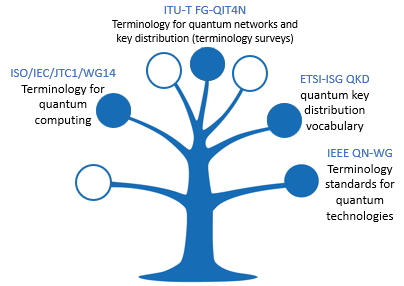

Blog
What’s in a name? Quantum terminology standards are underway
Published:
- Category: Standards

Authors: Clare Allocca and Erik DeBenedictis
While much of the quantum information science and technology (QIST) realm may be considered to be early on the technology evolution scale, the QIST community has begun to consider future standardization needs. Industry-driven standards can facilitate a robust and open global marketplace. With the rapid advances in development of QIST applications, several international standards development organizations (SDOs) are facilitating the development of standards and related documents and have already released publications, many of which are directed toward the more mature subtopic of quantum key distribution (QKD).
A successful QIST technology standardization strategy will build an infrastructure that supports innovation while providing access to a global marketplace. Since few system-level quantum products exist, standards are likely to first emerge for components in the QIST supply chain that enable and are essential for quantum products. Since relevant standards can only be successfully developed and implemented on a foundation of mutually understood language, terminology is a logical place to initiate standards development. Table 1 provides a perspective on standardization readiness for example topics. Terminology is the subject of several current standards efforts.
| Item | Potential Standardization Topic | Standardization Readiness |
| Sizable NISQ quantum computers | Performance benchmarks | Exploratory work underway |
| Quantum-relevant components: cryocoolers, resonators, etc. | Cryocooler temperature and capacity, resonator quality (“Q”) factor | Limited physical standards exist; other informal discussions initiated |
| Terminology | Definition of qubit, quantum volume, etc. | Underway |
What’s in a name?
A common language is essential at all stages of innovation, from reporting on fundamental research results to specifying product performance. Agreement on terminology will enable governments, industry, and the research community to more effectively define research portfolios. Later on, manufacturers will be able to access standard terminology that can enable product differentiation while easing entry into and acceptance in the global marketplace. Mutually understood terminology can also help to ensure that investigated characteristics in the research community can be related to desired performance characteristics in eventual products. Additionally, the process of developing terminology standards provides opportunities to initiate global conversations among the experts, fostering a mutual understanding of global needs, technology and product directions. As component and system technologies mature and corresponding standards-needs can be identified, the experts’ shared global perspective will help to assure and accelerate the development of effective standards that will support global innovation of quantum components and systems, resulting in timely and high-quality products in the marketplace.
Terminology standards are currently under development within several SDOs. The following is a list of specific terminology efforts currently underway. The quality of these deliverables reflects the involvement of appropriate experts in the technical community. QED-C members interested in participating, either as direct members of committees or as reviewers, are encouraged to contact or join the standards TAC for more information.

Overview of major ongoing quantum terminology-related standards activities
These reports are reviews of the respective terminology standards landscapes.
Subsequent blogs will further explore some of these and other related standards documents.
+++++++++++++++
Clare Allocca is with the Standards Coordination Office at the National Institute of Standards and Technology (NIST) and is also Chair of the US Mirror Committee for ISO-IEC/JTC1/WG14 Quantum computing.
Erik DeBenedictis is with Zettaflops, LLC and a participant in the US Mirror Committee for ISO-IEC/JTC1/WG14 Quantum computing.
+++++++++++++++
About QED-C: QED-C is an industry-driven consortium managed by SRI International that aims to enable and grow the quantum industry and associated supply chain. With more than 150 participants from industry, academia and government, QED-C connects stakeholders to speed quantum-based innovation and use. For membership information please contact admin@quantumconsortium.org.
This blog is an output of the QED-C Standards and Performance Metrics Technical Advisory Committee.